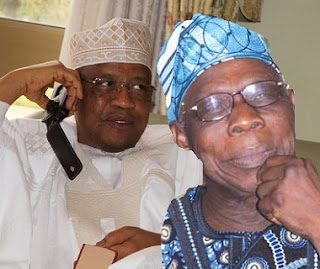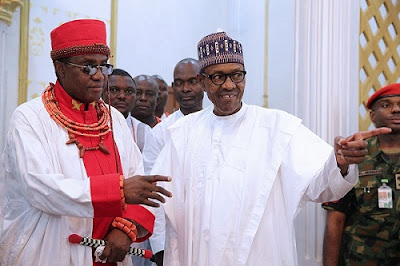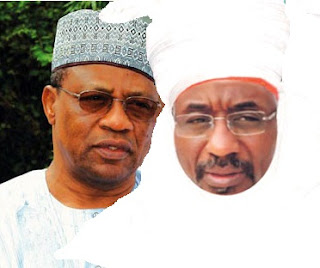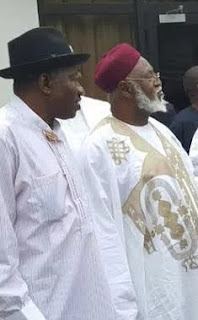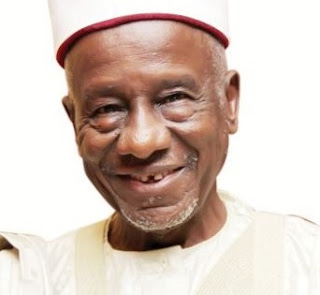More Shocking Secrets Of $2.1b Dasuki Scam: IBB, Emir Sanusi, Others, 'MENTIONED' As Beneficiaries; Why Dasuki Wants No-secret Trial
In a veiled manner, former Military Head of States, General Ibrahim Gbadamosi Babangida, Popularly known as IBB, a former Governor of the Central Bank of Nigeria, now Emir of Kano, Emir, Sanusi Lamido II may have been mentioned as prominent Nigerians who have benefitted from the arm slush fund allegedly misappropriated by former National Security Adviser to ExPresident Goodluck Jonathan, Colonel Sambo Dasuki.
Though the names of IBB and Emir Sanusi were not directly mentioned as beneficiaries of the slush fund, but the description of a certain ex-Head of State flown to Germany for medical attention pointed at IBB in yesterday's
Punch Newspaper's report pointed an obvious direction at the former ruler . The Former President was sometime 2015 flown to Germany when he was serious ill.
Also, the same
Punch Newspaper described another beneficiary as a certain monarch, whose coronation was funded with Dasuki's scam fund; the description which could be said to have matched Emir Sanusi Lamido Sanusi's, who also coincidentally had his coronation shrtly before the ouster of former President Goodluck Jonathan.
Well, the above mentioned may not be the beneficiaries, but
Punch Newspaper's description of the fresh beneficiaries pointed to them arguably.
There were indications on Thursday that former Nigerian leaders, traditional and religious leaders from across the country were listed as beneficiaries of the $2.1bn arms funds in the final report of the Presidential panel which probed military contracts from 2007 to 2015.
It was gathered that the report, which had been submitted to President Muhammadu Buhari, recommended the retrieval of undisclosed sums of money from some indicted persons, while in some cases, it recommended their prosecution.
A highly-placed security official, who spoke on condition of anonymity because of the sensitivity of the matter, said some former Heads of State, were listed as having received various sums of money from the Office of the National Security Adviser under Col. Sambo Dasuki (retd.).
The source added that a prominent northern traditional ruler was provided funds from the NSA’s office for the monarch’s coronation.
Giving further insights into what some of the funds were used for, the source explained that some were spent to pay the medical bills as well as travel expenses of some of the ex-leaders, who had to travel abroad to seek medical help for undisclosed aliments.
In one of the most notable cases, the report stated that the ONSA shouldered the cost of the medical trips of one of the ex-Heads of State to Germany.
The source added, “The list of beneficiaries from the ONSA under Col. Sambo Dasuki is very long.
“The list comprises very prominent Nigerians, including former Heads of State, many traditional rulers from the North and the South.
“Several religious leaders from the two dominant religions in the country also got funds from the ONSA.
“A former President of the country, who was sick, was flown out of the country to Germany for medical treatment. In fact, the former ONSA paid for the three trips the former leader made to Germany.”
It was learnt that the prosecution team was opposed to an open trial of Dasuki as this could result in disturbing revelations on how the $2.1bn under probe was disbursed.
The arms panel also established that the procurement processes adopted for the purchase of military hardware were arbitrarily and generally characterised by irregularities and fraud.
The highly-placed security official said the panel had interrogated some of the indicted officials, serving and retired officers, and some contractors.
The PUNCH learnt that the Federal Government would soon make public the final report just like it did with the interim report.
Barely three months after he assumed office in 2015, Buhari inaugurated a 13-man panel to probe procurement of arms and related military contracts between 2007 and 2015.
The panel had submitted two interim reports, where several serving and retired military officers were indicted.
Those indicted in the first two reports included Dasuki; a former Chief of Defence Staff, Air Chief Marshal Alex Badeh (retd.); two former Chiefs of Army Staff – Lt. Gen. Azubike Ihejirika (retd.), and Lt. Gen. Kenneth Minimah (retd.) – and ex-Chiefs of Air Staff, Air Marshal M. D. Umar (retd.), and Air Marshal Adesola Amosu (retd.).
Others indicted were Maj. Gen. E. R. Chioba (retd.), AVM I. A. Balogun (retd.), AVM A. G. Tsakr (retd.), AVM A. G. Idowu (retd.), AVM A. M. Mamu, AVM O. T. Oguntoyinbo, AVM T. Omenyi, AVM J. B. Adigun and AVM R. A. Ojuawo.
Among those also indicted were AVM J. A. Kayode-Beckley, Air Cdre S. A. Yushau (retd.), Air Cdre A. O. Ogunjobi, Air Cdre G. M. Gwani, Air Cdre S. O. Makinde, Air Cdre A. Y. Lassa and Col. N. Ashinze.
Several contractors, former ministers and government officials are currently being prosecuted for the roles they played in the disbursement of the funds.
In one of the interim reports, the panel said, “The procurement processes were arbitrarily carried out and generally characterised by irregularities and fraud.
“In many cases, the procured items failed to meet the purposes they were procured for, especially for the counter-insurgency efforts in the North-East.
“A major procurement activity undertaken by ONSA for NAF was that concerning the contracts awarded to Societe D’ Equipment Internationaux Nig. Limited between January 2014 and February 2015. NAF awarded 10 contracts totalling $930,500,690 to SEI Nig. Ltd.
“Letters of award and End User Certificates for all the contracts issued by NAF and ONSA respectively did not reflect the contract sums.
“Rather, these were only found in the vendor’s invoices, all dated March 19, 2015.”
A statement credited to the presidential spokesman, Mr. Femi Adesina, had said the Ode-led panel “comes against the background of the myriad of challenges that the Nigerian Armed Forces have faced in the course of ongoing counter-insurgency operations in the North-East, including the apparent deficit in military platforms with its attendant negative effects of troops’ morale.”
He added, “The committee will specifically investigate allegations of non-adherence to correct equipment procurement procedures and the exclusion of relevant logistics branches from arms procurement under past administrations, which, very often resulted in the acquisition of sub-standard and unserviceable equipment.”
It was not clear on Thursday if the Economic and Financial Crimes Commission had received a copy of the report or not, which was said to contain a list of those for further investigation and prosecution.
The spokesman for the EFCC, Wilson Uwujaren, said he did not have information on the subject.
When asked if the commission had received the report, he simply said, “I don’t know.”
In a veiled manner, former Military Head of States, General Ibrahim Gbadamosi Babangida, Popularly known as IBB, a former Governor of the Central Bank of Nigeria, now Emir of Kano, Emir, Sanusi Lamido II may have been mentioned as prominent Nigerians who have benefitted from the arm slush fund allegedly misappropriated by former National Security Adviser to ExPresident Goodluck Jonathan, Colonel Sambo Dasuki.
Though the names of IBB and Emir Sanusi were not directly mentioned as beneficiaries of the slush fund, but the description of a certain ex-Head of State flown to Germany for medical attention pointed at IBB in yesterday's
Punch Newspaper's report pointed an obvious direction at the former ruler . The Former President was sometime 2015 flown to Germany when he was serious ill.
Also, the same
Punch Newspaper described another beneficiary as a certain monarch, whose coronation was funded with Dasuki's scam fund; the description which could be said to have matched Emir Sanusi Lamido Sanusi's, who also coincidentally had his coronation shrtly before the ouster of former President Goodluck Jonathan.
Well, the above mentioned may not be the beneficiaries, but
Punch Newspaper's description of the fresh beneficiaries pointed to them arguably.
There were indications on Thursday that former Nigerian leaders, traditional and religious leaders from across the country were listed as beneficiaries of the $2.1bn arms funds in the final report of the Presidential panel which probed military contracts from 2007 to 2015.
It was gathered that the report, which had been submitted to President Muhammadu Buhari, recommended the retrieval of undisclosed sums of money from some indicted persons, while in some cases, it recommended their prosecution.
A highly-placed security official, who spoke on condition of anonymity because of the sensitivity of the matter, said some former Heads of State, were listed as having received various sums of money from the Office of the National Security Adviser under Col. Sambo Dasuki (retd.).
The source added that a prominent northern traditional ruler was provided funds from the NSA’s office for the monarch’s coronation.
Giving further insights into what some of the funds were used for, the source explained that some were spent to pay the medical bills as well as travel expenses of some of the ex-leaders, who had to travel abroad to seek medical help for undisclosed aliments.
In one of the most notable cases, the report stated that the ONSA shouldered the cost of the medical trips of one of the ex-Heads of State to Germany.
The source added, “The list of beneficiaries from the ONSA under Col. Sambo Dasuki is very long.
“The list comprises very prominent Nigerians, including former Heads of State, many traditional rulers from the North and the South.
“Several religious leaders from the two dominant religions in the country also got funds from the ONSA.
“A former President of the country, who was sick, was flown out of the country to Germany for medical treatment. In fact, the former ONSA paid for the three trips the former leader made to Germany.”
It was learnt that the prosecution team was opposed to an open trial of Dasuki as this could result in disturbing revelations on how the $2.1bn under probe was disbursed.
The arms panel also established that the procurement processes adopted for the purchase of military hardware were arbitrarily and generally characterised by irregularities and fraud.
The highly-placed security official said the panel had interrogated some of the indicted officials, serving and retired officers, and some contractors.
The PUNCH learnt that the Federal Government would soon make public the final report just like it did with the interim report.
Barely three months after he assumed office in 2015, Buhari inaugurated a 13-man panel to probe procurement of arms and related military contracts between 2007 and 2015.
The panel had submitted two interim reports, where several serving and retired military officers were indicted.
Those indicted in the first two reports included Dasuki; a former Chief of Defence Staff, Air Chief Marshal Alex Badeh (retd.); two former Chiefs of Army Staff – Lt. Gen. Azubike Ihejirika (retd.), and Lt. Gen. Kenneth Minimah (retd.) – and ex-Chiefs of Air Staff, Air Marshal M. D. Umar (retd.), and Air Marshal Adesola Amosu (retd.).
Others indicted were Maj. Gen. E. R. Chioba (retd.), AVM I. A. Balogun (retd.), AVM A. G. Tsakr (retd.), AVM A. G. Idowu (retd.), AVM A. M. Mamu, AVM O. T. Oguntoyinbo, AVM T. Omenyi, AVM J. B. Adigun and AVM R. A. Ojuawo.
Among those also indicted were AVM J. A. Kayode-Beckley, Air Cdre S. A. Yushau (retd.), Air Cdre A. O. Ogunjobi, Air Cdre G. M. Gwani, Air Cdre S. O. Makinde, Air Cdre A. Y. Lassa and Col. N. Ashinze.
Several contractors, former ministers and government officials are currently being prosecuted for the roles they played in the disbursement of the funds.
In one of the interim reports, the panel said, “The procurement processes were arbitrarily carried out and generally characterised by irregularities and fraud.
“In many cases, the procured items failed to meet the purposes they were procured for, especially for the counter-insurgency efforts in the North-East.
“A major procurement activity undertaken by ONSA for NAF was that concerning the contracts awarded to Societe D’ Equipment Internationaux Nig. Limited between January 2014 and February 2015. NAF awarded 10 contracts totalling $930,500,690 to SEI Nig. Ltd.
“Letters of award and End User Certificates for all the contracts issued by NAF and ONSA respectively did not reflect the contract sums.
“Rather, these were only found in the vendor’s invoices, all dated March 19, 2015.”
A statement credited to the presidential spokesman, Mr. Femi Adesina, had said the Ode-led panel “comes against the background of the myriad of challenges that the Nigerian Armed Forces have faced in the course of ongoing counter-insurgency operations in the North-East, including the apparent deficit in military platforms with its attendant negative effects of troops’ morale.”
He added, “The committee will specifically investigate allegations of non-adherence to correct equipment procurement procedures and the exclusion of relevant logistics branches from arms procurement under past administrations, which, very often resulted in the acquisition of sub-standard and unserviceable equipment.”
It was not clear on Thursday if the Economic and Financial Crimes Commission had received a copy of the report or not, which was said to contain a list of those for further investigation and prosecution.
The spokesman for the EFCC, Wilson Uwujaren, said he did not have information on the subject.
When asked if the commission had received the report, he simply said, “I don’t know.”
